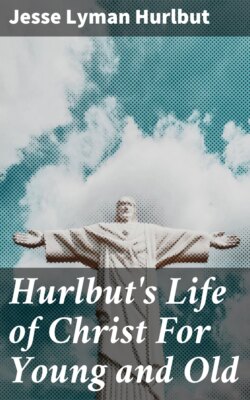Читать книгу Hurlbut's Life of Christ For Young and Old - Jesse Lyman Hurlbut - Страница 12
На сайте Литреса книга снята с продажи.
ОглавлениеCHAPTER 6
NOT LONG after Mary's visit, the child promised to Zacharias and Elizabeth was born. In Jewish families the coming of a child into the home was always the cause of great gladness; and the gladness was greater at the birth of this baby, because this was the first child, and the father and mother were old. All the friends of Zacharias and Elizabeth came to see them and to rejoice with them over the boy whom God had given them.
"He must be named Zacharias after his father," said the visitors.
"Not so," answered the mother; "he shall be named John."
"Why should you give him that name?" they said. "None of your family has ever been called John."
But Elizabeth insisted that her boy should bear the name John.
You remember that Zacharias had been stricken dumb at the time when the angel spoke to him in the Temple. In all the months since he had not spoken a word. Nor could he hear what was said; for now they made signs, to ask him what should be the child's name. They brought him a writing table, and on it he wrote, "His name is John." So that was the name of this child of promise, just as the angel Gabriel had said.
You may ask, what was a writing table? In those times paper was very scarce and high in its cost. It was used only for writing down matters that were important. For common uses, each family had a writing table, which was a board over which was spread a thin layer of wax. On this wax they marked what they wished to write, with a sharp-pointed pen of iron or steel. This kind of a pen was called a stylus. The other end of the pen was flat, like an ivory paper-cutter. After writing, they could smooth it all out again; and the wax was then ready to be used once more.
Just as soon as Zacharias had written the words "His name is John," the power to hear and to speak came back to him. He began to praise God in a loud voice, and gave forth a song of rejoicing. This song was afterward written, and may be read in the gospel by St. Luke, near the end of the first chapter.
Writing tablets
In this song, Zacharias gave thanks to God for having blessed his people and kept the promises that had been made in God's name by all the prophets of old time. The prophets, as you may know, were the good men who listened to God's words and then gave them to the people, speaking with God's power; and sometimes telling, long before the time, of great events that were to take place. They were men like Moses, who saw God face to face, and Samuel the wise ruler, and Elijah the prophet of fire, and Isaiah, who declared Christ's coming long before his day. In the Old Testament times there was always a prophet to tell the people the will of God. But since the Old Testament had been finished, almost five hundred years before this time, no prophet had stood up in Israel with the word of the Lord.
Zacharias knew that this newly-born child should grow up to give God's message to the people. He said in his song:
"And you, O child, shall be called the prophet of God;
For you shall go before the Lord Christ, to make ready a way for him;
You shall give to his people the good news of a Saviour,
And the forgiveness of their sins
Because of the tender mercy of God."
John the Baptist in the desert
In the home of Zacharias and Elizabeth the baby John grew up a strong, noble boy. Very early they told him of the angel's visit, and of the command that throughout his life he was not to taste wine nor any strong drink. He was under a vow or pledge of special service for God; and one sign of his pledge was to be his not tasting wine nor even eating grapes. Another sign was in leaving his hair to grow long and never cutting it. Everyone who saw him would know by these signs that he was pledged to a life of peculiar service to God.
When John became a young man he went away from his home and lived in the desert, alone with his own thoughts and with God. Very likely, his father and mother died before he went to live alone, for at the time of his birth they were old people and could not live many years.
John lived upon the plainest of food, the locusts that could be gathered in the field, and were boiled, to be eaten by the poorest people. He ate also the honey made by the wild bees and stored by them in hollow trees and holes in the rocks. All those years of his young manhood, John was thinking upon the work to which God had called him, talking with God and learning God's will; so that when the time came, he could give God's message to the people.
Plowing in Bible time
They sought out the inn at Bethlehem but Joseph found within its walls no place where his wife could rest after her long and wearisome ride.
